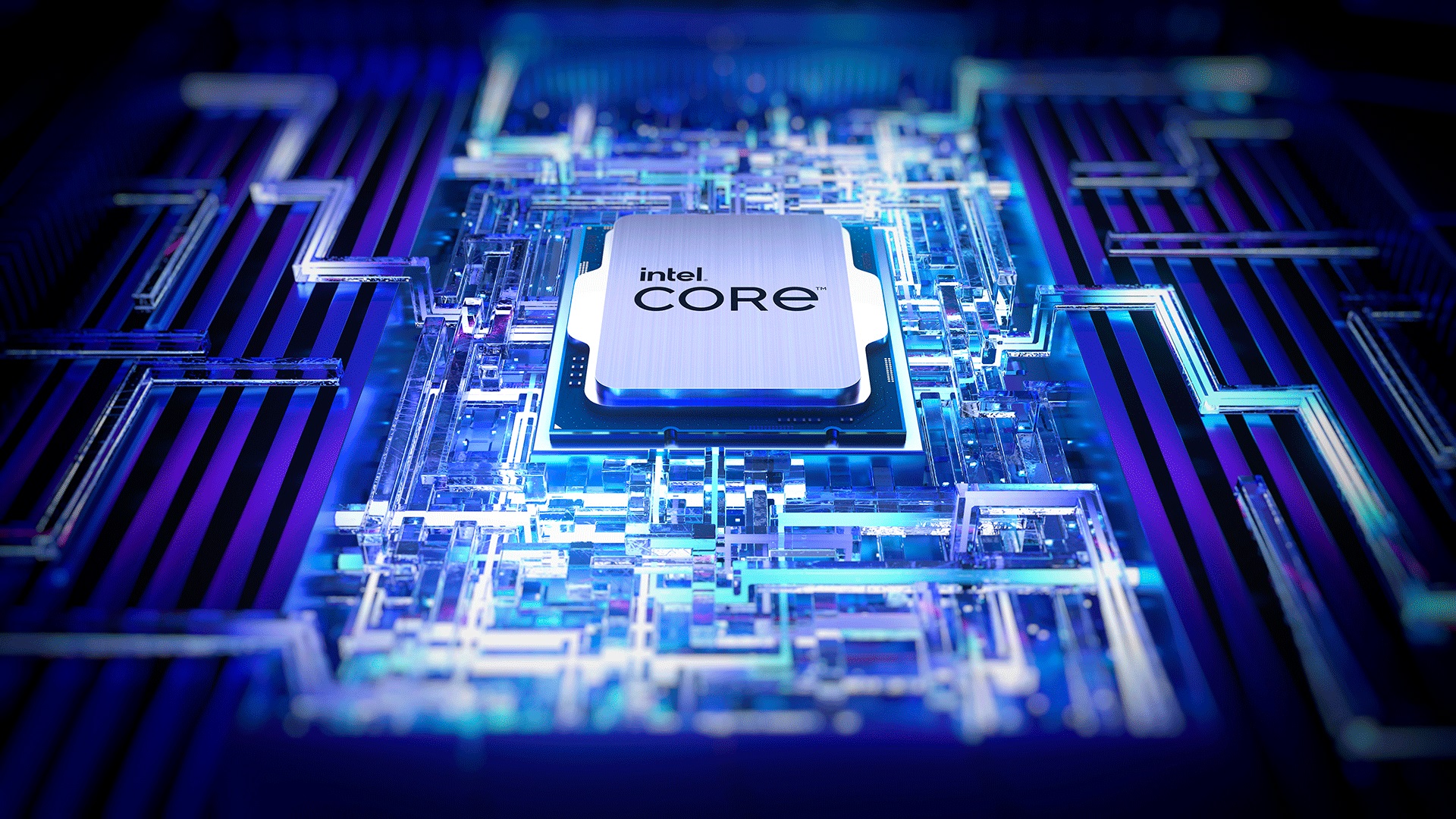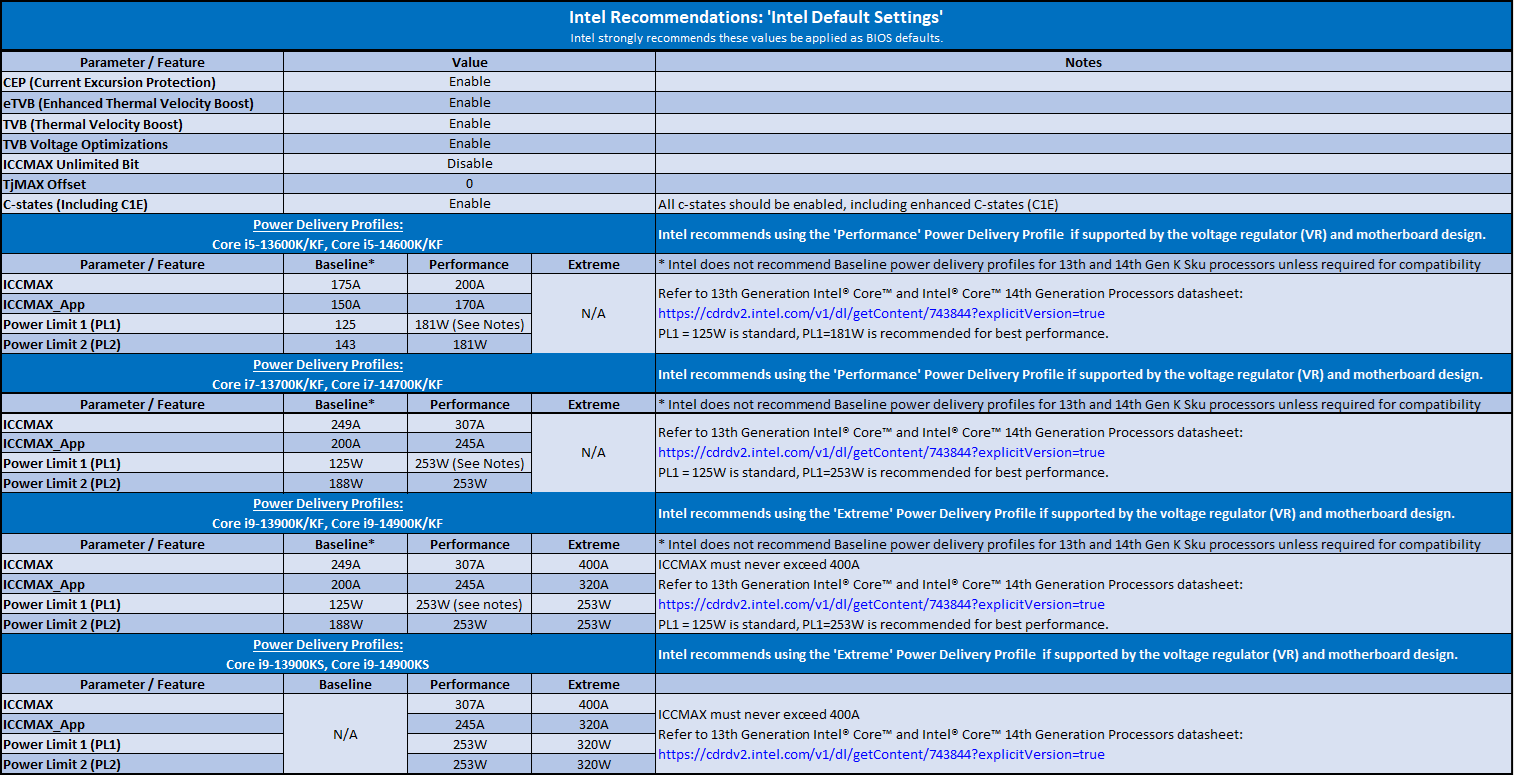Intel offers new guidance on 13th and 14th Gen CPU instability — but no definitive fix yet
The CPU maker found one power-related bug, but says that's not the end of the story.

Intel continues to investigate reports of instability on its 13th and 14th Generation desktop CPUs (K/KF/KS). While it has yet to identify the root cause of the problem, Intel has offered guidance on helping prevent the instability. Intel has also uncovered one power-related bug, and says that it’s working with vendors to distribute a patch for it.
Along with its motherboard partners, Intel has been diving deep into reports of its 13th Raptor Lake and 14th Generation Raptor Lake Refresh processors suffering from instability under load. Previously, reports surfaced that Intel had uncovered what was causing the stability issues. Several publications reported that Intel would soon send a firmware patch to resolve the issue. Still, Intel told Tom’s Hardware that it had “not confirmed root cause and is continuing, with its partners, to investigate user reports regarding instability issues on unlocked Intel Core 13th and 14th generation (K/KF/KS) desktop processors.”
One contributing factor, it says, is elevated voltage input to the processor allowing the CPU to run at turbo frequencies - even when it’s too hot to do so safely.
Intel says these conditions occur because of previously applied BIOS settings, but its analysis did reveal one bug. The bug is within its Enhanced Thermal Velocity Boost (eTVB) algorithm and can impact operating conditions for the affected CPUs. This algorithm should automatically increase the CPU clock frequency, but only when operating below a certain temperature.
To address the eTVB bug, Intel has released a patch to motherboard manufacturers. Patches should roll out in the form of BIOS updates before July 19, 2024. In the meantime, Intel has provided a table of recommended power delivery settings for its 13th and 14th Gen desktop CPUs.
This isn’t the first time Intel has suggested BIOS settings tweaks to help stave off instability. Asus released a new BIOS in April to follow Intel’s guidelines on power delivery. Then in May, Intel reportedly insisted motherboard partners implement its “Intel Default (Baseline) Profile” to establish correct power settings for the 13th and 14th Gen CPUs.
Intel also warns that users who still want to overclock or use higher power delivery settings than it recommends can “do so at their own risk as overclocking may void warranty or affect system health.”
Get Tom's Hardware's best news and in-depth reviews, straight to your inbox.

Jeff Butts has been covering tech news for more than a decade, and his IT experience predates the internet. Yes, he remembers when 9600 baud was “fast.” He especially enjoys covering DIY and Maker topics, along with anything on the bleeding edge of technology.
-
DS426 Not to put him on the spot but didn't Jay from Jayz2Cents say he switched from AMD to Intel due to stability issues and Intel "just working"? Anybody appreciate the humor/irony in that besides me? :ROFLMAO:Reply -
HaninTH Reply
All companies will have their ups and downs. Believing otherwise is short-sighted/fool hearty.DS426 said:Not to put him on the spot but didn't Jay from Jayz2Cents say he switched from AMD to Intel due to stability issues and Intel "just working"? Anybody appreciate the humor/irony in that besides me? :ROFLMAO:
How will Intel bounce back from these issues is my concern. Surely, they will, but will these issues require entirely new silicon?
Will AMD try to capitalize on Intel's travails and make further gains to their overall market share?
How is the overall PC/PC Equipment market doing and is there even any space to make any kind of movement or is the lull enough that Intel will be able to recover before anyone (mainstreamers) notices? -
DS426 Reply
Absolutely.HaninTH said:All companies will have their ups and downs. Believing otherwise is short-sighted/fool hearty.
...
Will AMD capitalize on it? Well, they usually fumble the ball when Intel hands them a marketing victory, so I doubt it, lol.
I imagine Intel can squash this just with tuning and soft updates (microcode/firmware), granted they may indeed find at some point a hardware flaw that really let the cat out of the bag on this issue.
Lunar Lake and Arrow Lake will have huge efficiency improvements such that I don't see Intel suffering from the nature of this issue for those chips... but stability issues could always creep up from another angle. -
bit_user IMO, the most disheartening aspect of all this is that they didn't discover it until well after Gen 14 launched! That's a bad indicator of their internal QA practices and represents a missed opportunity for them to fix it in Gen 14.Reply -
bit_user Reply
It's much too late for that. They will "fix" gen 13 & 14 processors by mandating safe BIOS settings to board makers. Intel won't bother doing a respin of Raptor Lake, right in the lead up to the launch of Arrow Lake.HaninTH said:How will Intel bounce back from these issues is my concern. Surely, they will, but will these issues require entirely new silicon?
You mean, will they do some ad campaign? Because, it seems like they do benefit by default.HaninTH said:Will AMD try to capitalize on Intel's travails and make further gains to their overall market share?
Seems like Intel could see a dip in their i7/i9 sales until Arrow Lake launches. Fortunately for them, they got through the launch of Gen 14 and holiday season, before this came to light.HaninTH said:How is the overall PC/PC Equipment market doing and is there even any space to make any kind of movement or is the lull enough that Intel will be able to recover before anyone (mainstreamers) notices?
I think a fix that doesn't compromise performance will not be possible.DS426 said:I imagine Intel can squash this just with tuning and soft updates (microcode/firmware), granted they may indeed find at some point a hardware flaw that really let the cat out of the bag on this issue.
No, I'm pretty sure we know PL2 for Arrow Lake will continue to be at 253 W for an 8P + 16E configuration.DS426 said:... Arrow Lake will have huge efficiency improvements such that I don't see Intel suffering from the nature of this issue for those chips... -
thestryker Reply
I honestly don't think they test retail boards. This is mostly a sign that they really need to and also probably need to have more strict requirements for board partner settings.bit_user said:IMO, the most disheartening aspect of all this is that they didn't discover it until well after Gen 14 launched! That's a bad indicator of their internal QA practices and represents a missed opportunity for them to fix it in Gen 14.
Except that he's not reported any issues with his system (which he certainly wouldn't be shy about), and none of this erases all the problems he had on AMD.DS426 said:Not to put him on the spot but didn't Jay from Jayz2Cents say he switched from AMD to Intel due to stability issues and Intel "just working"? Anybody appreciate the humor/irony in that besides me? :ROFLMAO: -
jp7189 Reply
Honest question, did this affect anyone in the mainstream? I doubt Dell et.al. would have ever entertained enabling TVB or changing power limits off the baseline.HaninTH said:All companies will have their ups and downs. Believing otherwise is short-sighted/fool hearty.
How will Intel bounce back from these issues is my concern. Surely, they will, but will these issues require entirely new silicon?
Will AMD try to capitalize on Intel's travails and make further gains to their overall market share?
How is the overall PC/PC Equipment market doing and is there even any space to make any kind of movement or is the lull enough that Intel will be able to recover before anyone (mainstreamers) notices?
In my mind, if you buying components to assemble yourself, your already in the enthusiast camp, and (presumably) have the knowledge to modify setting to avoid this problem.
That's not to take away from the disappointment we feel that Intel gave us hope that their procs would perform better while maintaining their frankly well-deserved reputation for stability. -
CmdrShepard Reply
I disagree with your assesment here because this isn't a bug that affects code execution directly like previous side channel vulnerabilities whose patching led to direct loss of computational performance.bit_user said:I think a fix that doesn't compromise performance will not be possible.
If there's any loss of performance it will come at the expense of boosting past the safe thermal limit (while at 90+ degrees). That's already a part of the curve where going further yields diminished returns at the expense of excessive heat and power consumption (think 3% performance with 50% more power or something to that tune). -
jp7189 In my mind, Intel still moved the bar forward from the 12900k, but to be sure I personally find it an enjoyable hobby to spend hours overclocking stuff.Reply
I had a 12900k that was constantly downclocking itself due to bumping the temp limit despite the water itself never exceeding 35C. I spent a lot of time tweaking, reinforcing the <bendable> socket, swapping water blocks to one with a more convex profile. I dropped a 13900k in to the exact same setup, and it never had temp issues and had no problem reaching and maintaining clocks the 12900k could never. Despite that, I've never noted crashes of any sort, but as I alluded to above I tend to set everything to manual, if for no other reason than to play with each thing.
